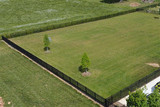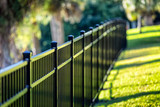Choosing the Right Fencing: Aluminum, Vinyl, Wood, or Chain Link?
When it comes to fencing, the material you choose can make a significant impact on both the aesthetics and functionality of your property. Whether you're looking to enhance privacy, improve security, or simply add a touch of style to your outdoor space, selecting the right fencing material is crucial. In this post, we'll explore the four most popular fencing materials: aluminum, vinyl, wood, and chain link, helping you make an informed decision that suits your needs.
1. Aluminum Fencing: The Low-Maintenance Option
Pros:
- Durability: Aluminum fences are highly resistant to rust and corrosion, making them ideal for areas with high humidity or near the coast.
- Low Maintenance: Unlike wood, aluminum doesn't need to be painted, stained, or treated regularly. A simple wash now and then will keep it looking new.
- Versatility: Available in various styles and colors, aluminum can mimic the appearance of wrought iron without the hefty price tag.
- Lightweight: Easy to install and handle, aluminum is a great DIY option.
Cons:
- Security: While aluminum fences are strong, they're not the most secure option, especially for privacy.
- Cost: Aluminum can be more expensive upfront compared to wood or chain link.
Best For: Homeowners looking for a decorative, low-maintenance fence that complements their landscape.
2. Vinyl Fencing: The Stylish, Long-Lasting Choice
Pros:
- Aesthetic Appeal: Vinyl fencing offers a clean, modern look with options that mimic wood or other materials.
- Durability: Vinyl is resistant to weather, rot, and pests. It won't warp, crack, or splinter over time.
- Low Maintenance: Similar to aluminum, vinyl requires minimal upkeep. A quick hose down will keep it clean.
- Variety: Available in many styles, heights, and colors, vinyl can be tailored to fit any property design.
Cons:
- Cost: Vinyl is generally more expensive than wood or chain link fences.
- Installation: While vinyl is relatively easy to install, it may require professional help due to its interlocking panel design.
- Repair: If damaged, vinyl panels can be more challenging to repair or replace than wood.
Best For: Those seeking a long-lasting, attractive fence with minimal maintenance, especially in neighborhoods with a uniform aesthetic.
3. Wood Fencing: The Classic, Versatile Option
Pros:
- Natural Beauty: Wood offers a warm, traditional look that can enhance the natural surroundings of your home.
- Versatility: From picket to privacy fences, wood can be customized in various styles and heights.
- Affordability: Wood is often more budget-friendly compared to vinyl or aluminum.
- Eco-Friendly: When sourced sustainably, wood is an environmentally friendly option.
Cons:
- Maintenance: Wood requires regular upkeep, including staining, painting, and sealing to protect against rot, pests, and weather damage.
- Durability: Over time, wood can warp, crack, or succumb to rot, especially in humid climates.
- Longevity: Wood fences typically have a shorter lifespan compared to vinyl or aluminum.
Best For: Homeowners who value aesthetics and are willing to invest time in maintenance for a classic, customizable look.
4. Chain Link Fencing: The Practical, Budget-Friendly Solution
Pros:
- Affordability: Chain link is one of the most cost-effective fencing options available.
- Durability: Made from galvanized steel, chain link fences are resistant to rust and weather damage.
- Low Maintenance: Requires little upkeep beyond occasional cleaning.
- Security: Provides a clear boundary and can be topped with barbed wire for added security.
Cons:
- Aesthetics: Chain link fences are functional but not typically chosen for their appearance. They can give a utilitarian or industrial feel to a property.
- Privacy: Unless you add privacy slats or vines, chain link fences offer little to no privacy.
Best For: Budget-conscious homeowners looking for a durable, low-maintenance fence, especially for large areas or secure enclosures.
Conclusion: Making the Right Choice
When choosing the right fencing material, consider the specific needs of your property, your budget, and your maintenance preferences.
- Aluminum is best for those seeking a stylish, low-maintenance option.
- Vinyl offers durability and a polished look, ideal for modern homes.
- Wood provides natural beauty and versatility, perfect for those who appreciate a classic aesthetic.
- Chain Link is the go-to choice for practicality and cost-effectiveness, especially for large or utilitarian spaces.
Each material has its own set of advantages and potential drawbacks, so take the time to assess which one aligns best with your goals. With the right choice, your fence will not only serve its purpose but also enhance the overall appeal and value of your property.
Recent Posts
-
Why Winter Is the Best Time to Order Your Fence
When most people think about installing a new fence, spring and summer usually come to mind. But sav …Jan 31st 2026 -
Experience, Reputation, Customer Service
Here’s why buying from OnlineFenceStore.com is a strong choice for fencing products: Key Advantages …Aug 13th 2025 -
How to Order Fence from OnlineFenceStore.com: A Step-by-Step Guide
How to Order Fence from OnlineFenceStore.com: A Step-by-Step Guide Ordering a fence online has never …Jul 30th 2025







